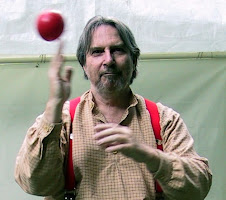We seem now to be much more swayed to acquire things than, say, in the 1950s. Certainly than in the 19th century. We think we are very ad-sophisticated, but we also seem to have so much more stuff than people did in previous times.
This subject has been brought forcefully to my attention in the last few years. My real estate agent tells me stories of houses she's sold where you had to clear a trail to get from room to room. More than one friend has been unable to sell his house because it is filled with his deceased spouse's possessions and he can't bring himself to either sort them or dump it all.
I knew we had a lot of stuff I didn't care about, but having to sort and dispose of 40 years of collecting was a shock. Several hundred skin and bath lotions, in duplicates of 5 to 10 each; four stacks of wicker baskets, each over seven feet high. Enough dish cloths to dry a small army. Thirty rolls of wrapping paper and enough seasonal, occasion and note cards from museum collections to fill a small museum; twelve baskets of clippings from The New Yorker magazine, despite the fact that we also had the complete CD collection of back issues.
And then there's my stuff: the remaining detritus, tools, and inventory from seven different businesses that had their day and died. Juggling and circus equipment from 20 years of teaching and performing,and of reviewing props for several magazines. Hundreds of psychological, perceptual, and psycholinguistic tests, all now obsolete, plus all the trial versions for the dozen tests I helped design or edit, most of which never got out of beta phase. Several hundred art prints, sketches, serigraphs, and oils, all moderately pleasing but few of any value.
And so it goes.
And to think I once was able to pack all my possessions (except the books and LPs, of course) into my 1960 MGA.
While much of this stuff was functional or professional, a great deal of it was simply consumer goods that seemed too good not to get. Had she lived another 74 years I'm sure my wife would have used up her cosmetics and cleansers. But she probably would have acquired as many more new ones, too. My own collecting is poorly excused by professional interest: no matter how good I get, I'll never be able to juggle, spin, balance, or roll 400 balls. No matter how accomplished a rope magician I become, no one will ever want to see all twenty-odd variations of the cut and restored rope (with a running narrative of the progression of stolen ideas and done-to-death patter).
So almost all of it has gone, but not without a wrench to the psyche. How can I even be the same person if I don't have all my stuff? (George Carlin has a routine exactly on this https://www.youtube.com/watch?v=MvgN5gCuLac&feature=kp.) What am I really if my library of eight-thousand books have been sold to Powells bookstore? Now no one will ever ask again, "have your read all these?"
Yet somehow it's not just me -- this applies to everyone I know. We have taken up acquiring stuff as the business of our lives. Perhaps this is what "not being poor" means. I don't recall that this was the case with earlier periods, 50+ years ago, but maybe I wasn't paying attention then. Once I thought this might just be a way of acquiring immortality, and while that's somewhat true, there's more going on here.
I know people who spend all of their disposable income on gourmet food in high-end restaurants, and others who spend everything on travel or packaged vacations. Perhaps we're simply like wolves or lions which given the opportunity will eat until immobilized, or pack rats who compulsively acquire every movable shiny thing they see.
Saving more for retirement? Not in this lifetime we don't. Our savings are over-depleted paying for the life we think we deserve and the stuff we want now.
We weren't always like this, and it's not just that there are more things to have. Perhaps there's a reason companies will spend so many millions on 30-second ads in a Superbowl game. Perhaps we truly are those storied suckers, one born every minute.


No comments:
Post a Comment